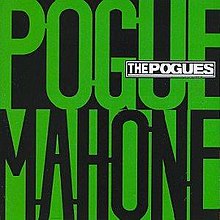music.wikisort.org - Composition
Pogue Mahone is the seventh and final studio album by The Pogues, released in 1996.[7][8] The title is a variant of the Irish phrase póg mo thóin, meaning "kiss my arse", from which the band's name is derived. It was the band's second studio album recorded after the departure of Shane MacGowan, and features Spider Stacy in the role of lead singer.[3]
| Pogue Mahone | ||||
|---|---|---|---|---|
 | ||||
| Studio album by The Pogues | ||||
| Released | 27 February 1996 | |||
| Recorded | 1995 | |||
| Studio | RAK Studios, London | |||
| Genre | Folk rock | |||
| Length | 43:36 | |||
| Label | WEA[1] | |||
| Producer | Steve Brown[2] | |||
| The Pogues chronology | ||||
| ||||
| Singles from Pogue Mahone | ||||
| ||||
| Review scores | |
|---|---|
| Source | Rating |
| AllMusic | |
| Robert Christgau | |
| The Encyclopedia of Popular Music | |
| Entertainment Weekly | B+[6] |
| MusicHound Rock: The Essential Album Guide | |
| The New Rolling Stone Album Guide | |
Overview
The album was not a critical or commercial success. After its release founding member Jem Finer left the band, and the remaining members decided to end their run together as well. The album yielded one single, "How Come". "Love You Till the End" was to be the second single, but this was never released.[9] The song appears in the 1999 movie Mystery, Alaska and on the soundtrack to the movie P.S. I Love You.
Critical reception
Trouser Press wrote that a "shortage of songs that are more than workably agreeable and a complete lack of edge in their performances leaves the harmless album sounding like the work of a skilled and spirited but bog-ordinary Irish pub band."[10] The Los Angeles Times wrote that "some numbers sound almost new age, thanks to an airy whistle, while others sound like dull FM-rock with a dash of Irish flavor."[11]
Track listing
Standard edition
- "How Come" (Ronnie Lane, Kevin Westlake) – 2:50
- "Living in a World Without Her" (Darryl Hunt, James McNally) – 3:20
- "When the Ship Comes In" (Bob Dylan) – 3:14
- "Anniversary" (Jem Finer) – 4:06
- "Amadie" (Andrew Ranken) – 1:53
- "Love You 'Till the End" (Hunt) – 4:32
- "Bright Lights" (Finer) – 2:37
- "Oretown" (Finer) – 3:50
- "Pont Mirabeau" (Guillaume Apollinaire, Finer; translated by Finer and Samuel Edward Finer) – 3:31
- "Tosspint" (Finer) – 3:32
- "Four O'Clock in the Morning" (Ranken) – 3:12
- "Where That Love's Been Gone" (Ranken, Steven Skull) – 3:50
- "The Sun and the Moon" (Jamie Clarke, Spider Stacy) – 3:22
Bonus tracks (2004 reissue)
- "Eyes of an Angel" (Finer) – 2:54 (B-side to "How Come")
- "Love You Till the End" (Hunt) – 3:54 (Stephen Hague Mix)
Personnel
Credits are adapted from the album liner notes, except where noted.[12]
- The Pogues
- Spider Stacy - lead vocals
- Jem Finer - banjo, guitar, hurdy-gurdy
- Andrew Ranken - drums; co-lead vocals on "Amadie"
- Darryl Hunt - bass guitar, backing vocals
- James McNally - accordion, whistle, low whistle, piano, Uilleann pipes
- David Coulter - mandolin, ukulele, djembe, shaker, tambourine
- Jamie Clarke - guitar, bass guitar, backing vocals
- Additional musicians
- Stephen Warbeck - mandolin, piano and accordion on "How Come"
- Steve Brown - backing vocals on "How Come"
- Stephen Hague - backing vocals on "How Come"
- Jon Sevink - fiddle on "Living in a World Without Her" and "Anniversary"
- Debsey Wykes - backing vocals on "Anniversary" and "Love You 'Till the End"
- Anne Wood - violin on "Where That Love's Been Gone"
- Kick Horns - brass on "Eyes of an Angel"[13]
- Electra Strings
- Caroline Lavelle - cello on "Anniversary", "Love You 'Till the End" and "Pont Mirabeau"
- Jocelyn Pook - viola on "Anniversary", "Love You 'Till the End" and "Pont Mirabeau"
- Julia Singleton - violin on "Anniversary", "Love You 'Till the End" and "Pont Mirabeau"
- Sonia Slany - violin on "Anniversary", "Love You 'Till the End" and "Pont Mirabeau"
- Technical
- Steve Brown - producer, engineer, mixing
- Shelley Saunders - assistant engineer
- Steve Musters - mixing assistant
- Stephen Hague - additional production and mixing on "How Come"
- Mike "Spike" Drake - mixing on "How Come"
- Ian Cooper - mastering
- Darryl Hunt - cover design, cover art
- Claudia Pöschl - cover design, cover art
- Steve Pyke - photography, portraits
References
- The New Rolling Stone Album Guide. Simon & Schuster. 2004. p. 643.
- MusicHound Rock: The Essential Album Guide. Visible Ink Press. 1999. p. 881.
- AllMusic review
- "Robert Christgau: CG: The Pogues". www.robertchristgau.com.
- Larkin, Colin (2006). The Encyclopedia of Popular Music. Vol. 6. MUZE. p. 578.
- "Pogue Mahone". EW.com.
- "The Pogues | Biography & History". AllMusic.
- Thompson, Dave (20 December 2000). Alternative Rock. Hal Leonard Corporation. ISBN 9780879306076 – via Google Books.
- "Pogues Singles". Pogues.com. 17 March 1988. Retrieved 5 March 2012.
- "Pogues". Trouser Press. Retrieved 20 December 2020.
- "ALBUM REVIEWS : * The Pogues, "Poguemahone," Mesa/Blue Moon". Los Angeles Times. 24 February 1996.
- Pogue Mahone (Media notes). The Pogues. WEA. 1996.
{{cite AV media notes}}: CS1 maint: others in cite AV media (notes) (link) - "How Come". Discogs. Retrieved 13 March 2021.
External links
На других языках
[de] Pogue Mahone
Pogue Mahone ist das siebente und letzte Musikalbum der britischen Folk-Punk-Band The Pogues.- [en] Pogue Mahone
[es] Pogue Mahone
Pogue Mahone es el séptimo disco de estudio de The Pogues, originalmente lanzado en 1996.Другой контент может иметь иную лицензию. Перед использованием материалов сайта WikiSort.org внимательно изучите правила лицензирования конкретных элементов наполнения сайта.
WikiSort.org - проект по пересортировке и дополнению контента Википедии